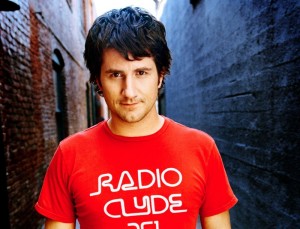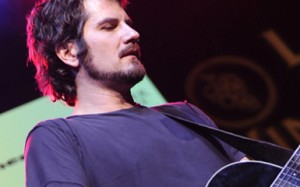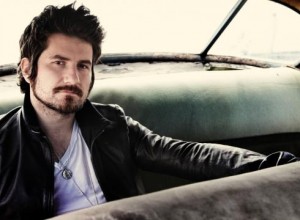Q&A With Matt Nathanson
posted in: Exclusive Interviews • Features • Pop
 Following up a beloved album that spawned four popular singles and spent thirty-four weeks on the Billboard charts could be a stressful endeavor for a lot of musicians. But not Matt Nathanson. The San Fransisco-based singer-songwriter catapulted into the spotlight with his 2007 album Some Mad Hope, and since then he’s been everywhere”touring with the Indigo Girls, performing on Live From Daryl’s House and providing the melancholy soundtrack for primetime dramas ranging from CSI to 90210 to Vampire Diaries.
Following up a beloved album that spawned four popular singles and spent thirty-four weeks on the Billboard charts could be a stressful endeavor for a lot of musicians. But not Matt Nathanson. The San Fransisco-based singer-songwriter catapulted into the spotlight with his 2007 album Some Mad Hope, and since then he’s been everywhere”touring with the Indigo Girls, performing on Live From Daryl’s House and providing the melancholy soundtrack for primetime dramas ranging from CSI to 90210 to Vampire Diaries.
But Nathanson didn’t let the pressure of releasing a follow-up get to him, taking four years to carefully craft his most recent effort Modern Love. We caught up with Nathanson to talk about Modern Love, his new, hopeful outlook on life and the perks of being a rock star.
OS: This album as a lot to do with conflict, and you’ve even said that the title”Modern Love”is about conflicting ideas. Can you explain what you feel the conflicts are between modernity and love?

MN: Well, it’s sort of not conflicting as much as much as it is the duality. It’s just this thing where “love” is ancient and amazing and hard to handle and difficult to understand, and “modern” is a functional concept. Modern art, modern architecture”it’s well-though-out answers to questions like the most efficient way to cool or heat a house. Modern architecture deals with that. Or, the most efficient way to build a chair. So, the idea for me was this duality of these two things that, in theory, are mutually exclusive, but actually kind of work together, and how do they work as a unit? We’re in a time now where things move so fast that if you want to buy a record you can just click a button, whereas before when I was a kid, I had to get on my bike and save up money and bike over to the record store and physically pick it up and bike home and put it on.
It’s the idea of how you can sort of have… well, not sort of. You can have entire relationships on Facebook or Twitter, without actually dealing with people one-on-one. It’s like the great human collision. Is this idea of, where does love exist? How does love function? Where does that molten part of who we are”how does that show up now in a time where the emphasis is not put on actual human contact and being face-to-face with the person or the record? You can see a whole live stream of a show on the Internet and never leave your house, when really the best part of a live show is being in that room. And I’m not saying that technology isn’t amazing, because it’s totally amazing. But it shouldn’t completely replace the experience, because what’s so amazing about these experiences is the effort extended by everyone around and the crashing together of people. So that’s what the record’s about thematically, this idea of, “Where does this stuff come up now? Where do the human parts of ourselves live in a time where we’re more and more technologically based, and moving faster and faster?”
And then sonically, the record took on a similar kind of aesthetic”acoustic guitars and a voice and really well-recorded drums. Then we took it back to the laboratory and kind of mashed it around a little bit, and kind of beat it up. We put it through the computer and messed around, so it became a similar thing”where does the organic meet the non-organic, and the greatness that can come out of that. Not saying that the record is “greatness”. But where can the heart come out of that, the humanity? So that’s a very long answer to your pretty short question. [Laughs]
OS: Obviously that question doesn’t have an easy answer, but what sorts of come up with? Where does the love reside these days?
MN: I really don’t know. It’s funny, like, it still needs to exist within. But we’re in a weird space. We’re really in a transitional place where people worship at the altar of celebrity and television, and success is just by fame. People have to fight to get to the core stuff, and they have to work harder, now more than ever, to get through the static. So I don’t really know. I only know for myself, I don’t know for anybody else.
OS: A lot of the songs on the new record were inspired by your friends who were going through serious relationship problems. Have any of them heard the new songs yet and been like, Hey, is this about me?
MN: [Laughs] No, I haven’t had anybody do that, which is great. I always sort of threw my own self in a little bit, but I’ve only had a couple times in my life making albums where people have been like, Is that song about me? I have one friend of mine who is convinced that I wrote a song about him, and it has nothing to do with him. I’m like, “Dude, not at all,” and he’s just like, “Okay… but I think it is.” The record’s only a few days old, so I’m sure that maybe some people will come out of the woodwork. But yeah, it was just about all these experiences I was having, through other people and through myself.
 OS: What’s interesting about this record is that even the songs that sound like they were inspired by sadder experiences have a glimmer of hope in them.
OS: What’s interesting about this record is that even the songs that sound like they were inspired by sadder experiences have a glimmer of hope in them.
MN: Yeah, it’s funny. The hope that came into this album was a strange thing. None of my other records really were particularly hopeful, and I think I kind of turned a corner a little bit. And so the writing changes because it comes out of you. It’s funny because I never thought, “Whatever I write comes from me, but I control it, I can make it do what I want to do.” And you really can’t. It is what it is. If you’re feeling hopeless, no matter how hard you try, the record still kind of sounds hopeless. So, hope is a hard thing, and joy is a hard thing to put into songs. With this record I just think I felt… I never really thought about it, actually, but I think now that you said that… there’s just more hope in my life, you know? Just a better space than I’ve ever been.
OS: This is your first album since Some Mad Hope, which was your breakout success and also your sixth album. What was it like to go from being relatively under the radar to hearing your songs everywhere?
MN: Pretty fun! I mean, it happened so gradually that it just felt like a natural thing, it felt like a natural progression. I had a blast. It was totally validating and it did not intimidate me in any way. A lot of people say, “Was it difficult for you to write for the next record after this success?” And no, I never felt that way. I literally never felt that way. I always kind of felt like, “Oh, this is neat. Now people are hearing this on such a mass level.” I felt confident in a way that I hadn’t before going into this record. It was cool.
OS: You recently said of your first album that It was inspiring and empowering to not have to wait to get signed to a record label to have my own CD. Has being on a label changed the way you view your music?
MN: No, not at all. The other part of having made records for so long is just that I’ve gotten to a point where I just don’t care what anyone else thinks during the process except for my co-writer and co-producer Mark [Weinberg], and whoever’s involved immediately with the record, the small team that we use to make the record. But other than that I just don’t really take anybody’s outside opinions, because I just don’t think anybody has any idea about what I want. For me, it’s all about making the record I want to make and trusting that, and the process of getting to that [record]. Then you include everybody, give them the record after the fact like, Here it is! Because everybody’s got opinions. I just don’t include them. I’m pretty free.
 OS: On an unrelated note, last month you gave the commencement address at Proctor Academy. What was writing that like, compared to writing songs?
OS: On an unrelated note, last month you gave the commencement address at Proctor Academy. What was writing that like, compared to writing songs?
MN: Oh my God, the anxiety I had… I’ve never been so anxious. I thought it was going to be kind of easy, and then I realized how not easy it is. It’s not the speaking part that wasn’t easy, it was just wrangling my thoughts in a way that made sense and that had a flow to it. It ended up being really, super fun. It ended up being a really cool experience, but it was 100 percent outside of my comfort zone. Which is sort of what the speech was about, actually, which was this idea that it’s not about being content. It’s about pushing, and being comfortable being uncomfortable. So that’s kind of how we did it. I went up to New Hampshire a little bit beforehand, hung out with my friend who is a teacher at Proctor actually, and batted ideas around with him. He helped me push way outside. It was cool, it was a fucking blast. I had a great time.
OS: Has your success afforded you any other cool opportunities like that?
MN: I feel like that’s the best part of my job, is that my success affords me these opportunities to go to Daryl Hall‘s house in upstate New York and play music with him or go on tour with the Indigo Girls who are my heroes from way back. I feel like that’s the perk. The job itself is amazing”I get to play music and I get to do what I love and what I’m passionate about. And then the perks of it are that I get to interact with people who are my heroes, or get opportunities to speak at places. That stuff is all just totally crazy. Icing on the cake.
Give Matt’s new single “Faster,” a listen, and if you’re into it (how could you not be?) check out the new album Modern Love.
